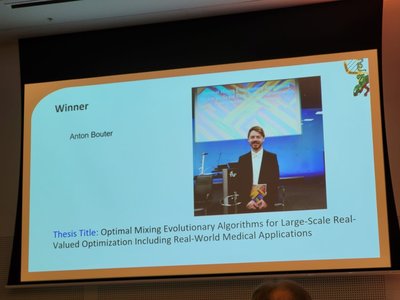Anton Bouter received the award – carrying a monetary value of $2,000 – at the Genetic and Evolutionary Computation Conference (GECCO) in Melbourne. His thesis is titled ‘Optimal mixing evolutionary algorithms for large-scale real-valued optimization - Including real-world medical applications’. One of these real-world medical applications, developed by CWI and Amsterdam UMC, helps doctors determine the best plan for internal radiotherapy (brachytherapy). This makes prostate cancer more treatable. The algorithm has been in use in Amsterdam UMC since March 2020.
Brachytherapy involves placing a number of hollow tubes as close to the tumour as possible, through which a radioactive source is passed. The main challenge is to calculate how long the radiation source should remain in the tubes. This determines how much radiation is delivered. If it's too little, you won't get rid of the tumour properly, but if you leave the source in too long, you damage healthy tissue.

Evolutionary algorithm
The algorithm Bouter worked on helps determine the ideal amount of radiation needed to effectively treat the tumour. These calculations are made while the patient waits with the tubes already placed in the tumour. "Normally, an algorithm has no further information about the problem it has to solve - the problem is considered a 'black box'. Our form of AI is an evolutionary algorithm that uses information about how the problem is defined," explains Bouter. The problem has to be formulated in such a way that the AI comes up with the best solution.
Bouter co-wrote the formulation, but the first version produced high-quality plans that took the AI an hour to complete. "That's too long for the patient, so we had to come up with something that would still give you a good plan in a short time."
Parallelization techniques
He achieved this by using certain parallelization techniques. These ensured that instead of taking an hour, the AI only took 30 seconds to come up with plans that were acceptable to the physician. "The biggest challenge in my research was to get the most out of the algorithm. A lot of calculations have to be done for each organ to determine the right dose of radiation - we are talking about tens of thousands of points. These calculations need to be done simultaneously to save time. I used parallelization techniques to speed things up."
About the award
The ACM SIGEVO Dissertation award is presented annually. It recognizes outstanding dissertation research by doctoral candidates in the field of evolutionary computation.
